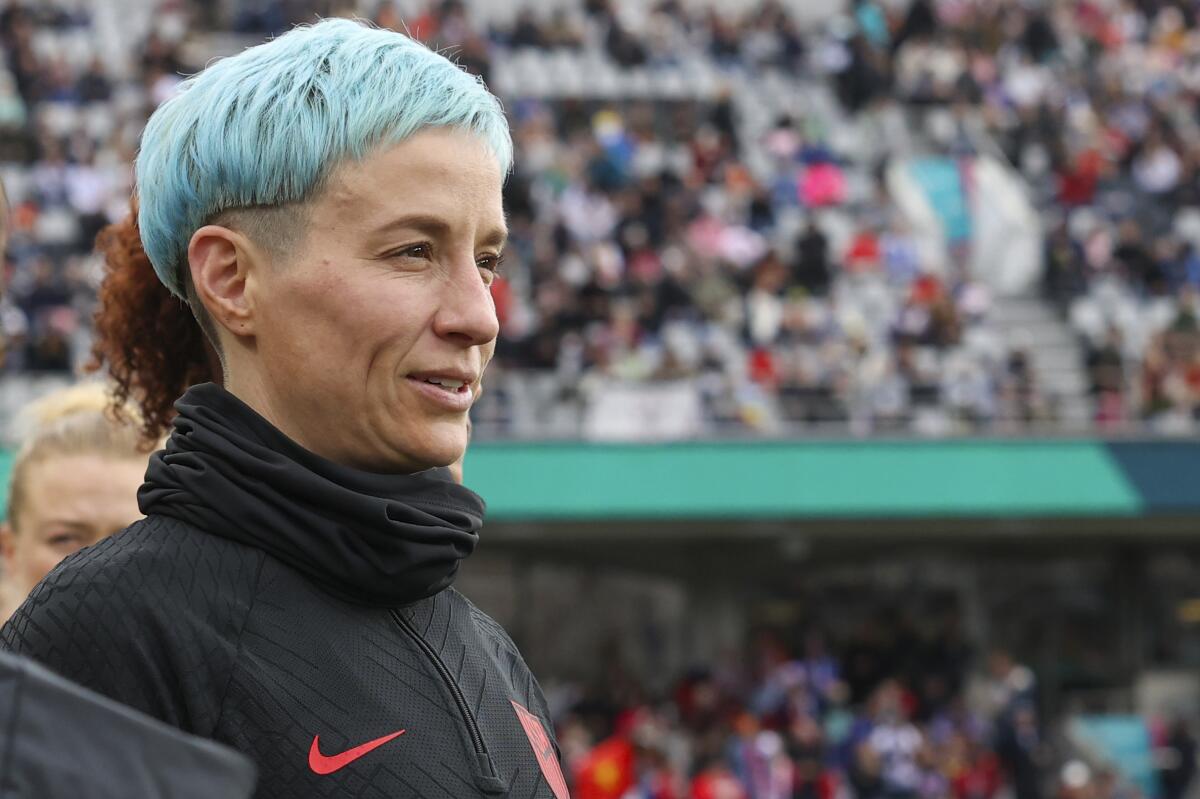“I’m Out of Here”: Медап Rapinoe Leaves America, Vows Never to Return
In a move that has reverberated across the sports and social justice landscape, Megan Rapinoe, the iconic U.S.
Women’s National Soccer Team (USWNT) player, has made a resolute decision: she is leaving America and vowing never to return.
This unprecedented announcement has sparked a myriad of reactions, with fans, critics, and the general public attempting to comprehend the implications of Rapinoe’s departure.
Megan Rapinoe’s journey from a young girl playing soccer in Redding, California, to an international soccer sensation and a fervent advocate for social justice causes has been nothing short of extraordinary.
Her skill on the field, marked by a lethal left foot and unparalleled playmaking abilities, catapulted her to the forefront of women’s soccer. But Rapinoe’s impact extends far beyond the pitch.

As an openly gay athlete, Rapinoe became a beacon of representation for the LGBTQ+ community. Her courage in taking a knee during the national anthem in solidarity with Colin Kaepernick’s protest against racial injustice positioned her as a vocal advocate for change. However, it’s precisely this unwavering commitment to her beliefs that has made her a polarizing figure.
The decision to leave the United States did not happen in isolation. Recent events, particularly an incident at Guy Fieri’s restaurant, played a pivotal role in what appears to be a tipping point for Rapinoe. The restaurant, typically known for its welcoming atmosphere and love of good food, became an unexpected battleground.
As Rapinoe entered the establishment, she was met not with cheers or indifference, but with a cascade of boos that echoed through the venue. The situation escalated to the point where the restaurant’s management made the extraordinary decision to ask Rapinoe to leave. This incident, widely covered in the media, brought to light the deep-seated divisions within American society and left Rapinoe visibly disheartened.
Megan Rapinoe’s activism, though celebrated by many, has also made her a target for criticism. Her calls for equal pay, LGBTQ+ rights, and racial justice have been met with fervent support, but they’ve also generated opposition from those who view her stances as too political for a sports figure. The incident at Guy Fieri’s restaurant is emblematic of the broader challenges faced by high-profile individuals who use their platform to advocate for social change.
Rapinoe’s departure follows a trajectory of increasing public backlash against athletes engaging in activism. The criticism isn’t confined to her sporting endeavors; it extends into her personal life. Her relationship with basketball star Sue Bird, celebrated by many as a positive representation of LGBTQ+ love, has also faced scrutiny and commentary, underscoring the intersectionality of her public image.
Megan Rapinoe’s decision to leave America is layered with personal and political implications. In her public statement, she alludes to feeling like a “stranger in her own home.” This sentiment captures the profound impact that societal divisions, public backlash, and the incident at the restaurant have had on her sense of belonging.
Part of Rapinoe’s identity is intricately linked with her role as a public figure and activist. Her departure raises questions about the toll that public scrutiny and the increasingly polarized political climate can take on individuals who choose to use their platform for advocacy. It also highlights the complex relationship between personal identity, patriotism, and dissent.
In the subsequent parts, we’ll delve deeper into the societal implications of Rapinoe’s departure, the broader context of public figures leaving the U.S., and the potential consequences for the nation’s ongoing conversations about social justice and free speech. Stay tuned for a comprehensive exploration of Megan Rapinoe’s departure and its impact.
Rapinoe’s decision to never return to America raises fundamental questions about the intersection of dissent, patriotism, and the right to critique. In a nation built on principles of free speech and the right to protest, her departure challenges the notion that true patriots must conform to a particular narrative. Сап опe be both deeply patriotic and critical of aspects of their nation?

The right to critique is a cornerstone of democratic societies. It is an acknowledgment that progress and improvement come through acknowledging flaws and working towards solutions. Rapinoe’s exit brings to the forefront a discussion on how dissent is received and whether it is possible to express love for one’s country while acknowledging its imperfections.
While Megan Rapinoe’s departure is significant, it isn’t an isolated occurrenсе. Іп recent years, several public figures have expressed their desire to leave the United States for various reasons, including political disillusionment, concerns about societal divisions, or simply a quest for a different lifestyle. Each departure contributes to a larger narrative about the challenges faced by individuals navigating the complexities of a changing nation.
Public figures leaving the U.S. often cite political disillusionment as a primary motivator. The increasing polarization of American politics, coupled with divisive rhetoric and policy decisions, has led some individuals to question their alignment with the nation’s direction. While political differences have always existed, the current climate seems to have amplified the sense of urgency for those considering alternatives.
Issues of social justice, equality, and inclusivity have also played a role in public figures seeking alternatives outside the United States. The desire to live in a more inclusive and welcoming environment is a driving force for many who feel that their values align more closely with nations that prioritize social progress.
Globalization has made it increasingly feasible for individuals, particularly those with means and influence, to choose where they reside based on lifestyle preferences. The ability to work remotely, coupled with a globalized perspective, has led some public figures to explore living in countries that align more closely with their personal values and aspirations.






